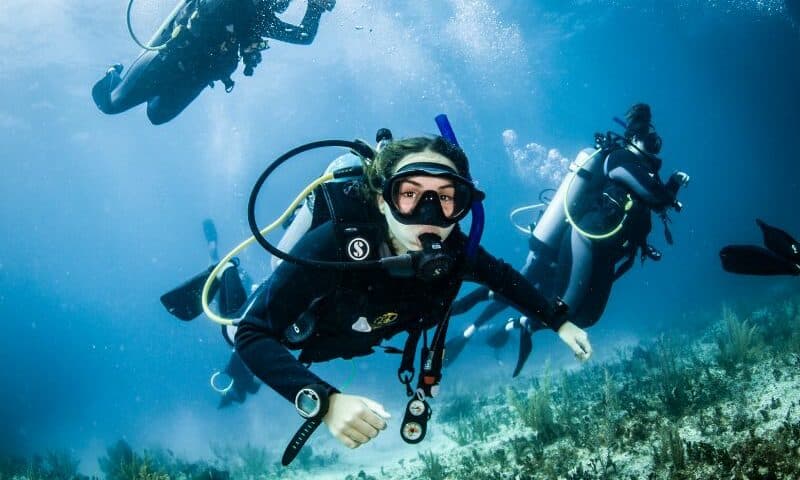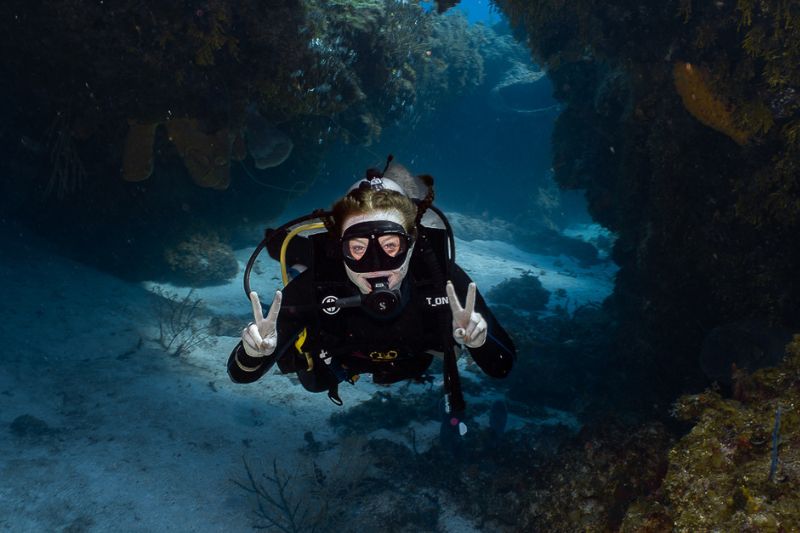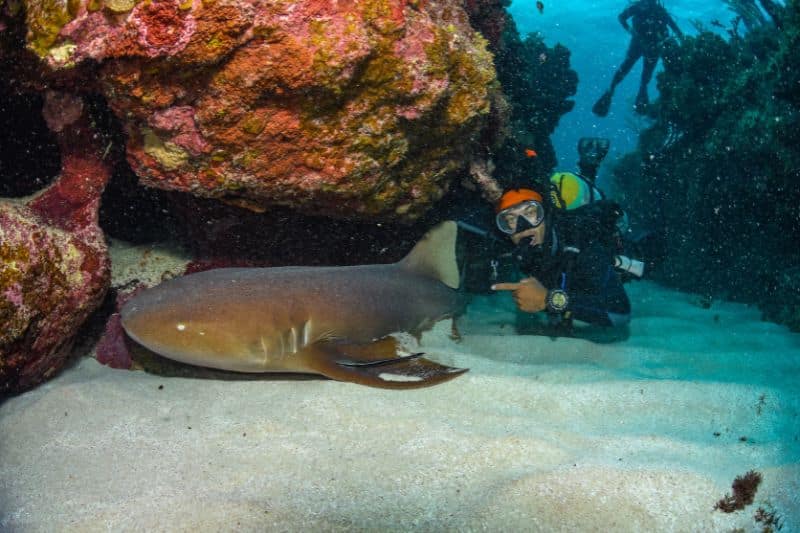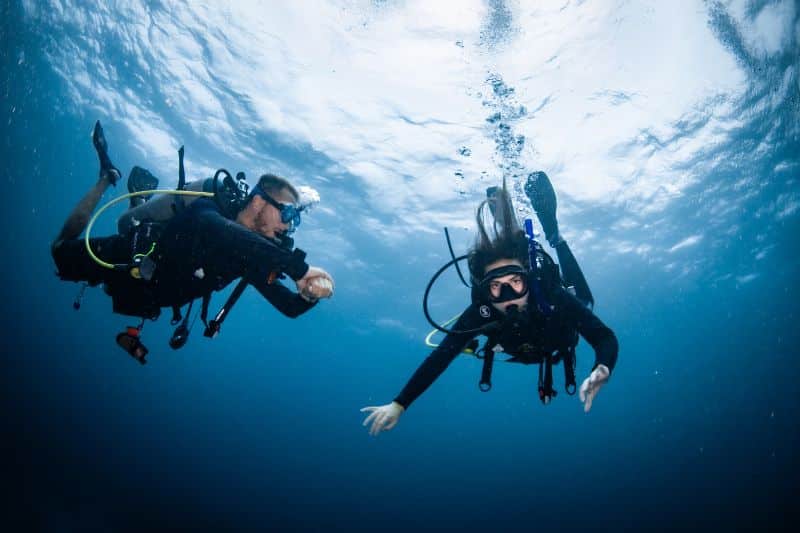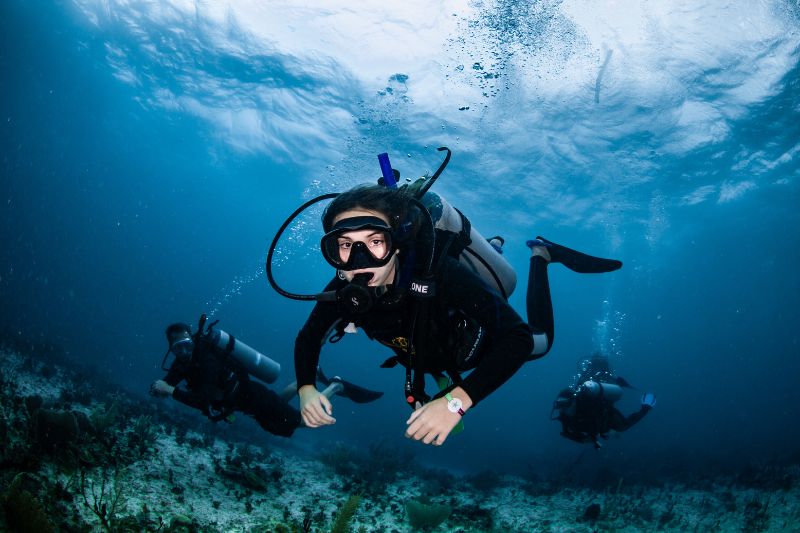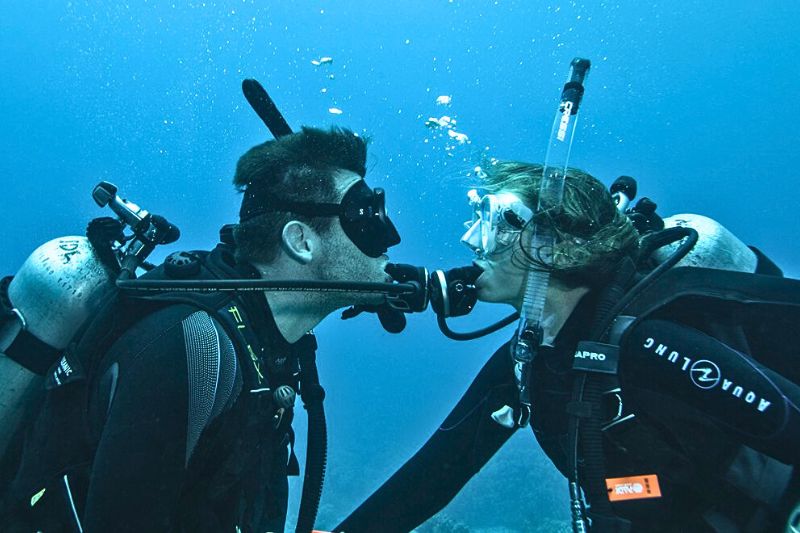3. Strategies to Manage and Prevent Anxiety While Diving
| Strategy |
Main Benefit |
| Controlled breathing |
Reduces anxiety, improves air consumption, prevents hyperventilation |
| Visualization and mental preparation |
Boosts confidence and reduces anticipatory fear |
| Gradual exposure |
Helps you adapt to the environment and build confidence step by step |
| Checklists and routines |
Lower pre-dive stress and ensure readiness |
| Professional support and communication |
Experienced instructors can tailor training and provide reassurance |
| Immediate coping techniques |
“Stop, breathe, think, act” helps interrupt the panic cycle |
| Familiarity with your gear |
Reduces uncertainty and increases your sense of safety |
The fear of scuba diving begins to fade when your body learns that underwater breathing is stable and calm. With guidance and repetition, the fight-or-flight response turns into relaxation. Soon, diving becomes a meditative experience instead of a tense one.
3.1. How to Overcome Fear of Scuba Diving Step by Step
If you want to know how to overcome fear of scuba diving, follow these steps designed by professional instructors and psychologists who specialize in helping new divers manage anxiety underwater.
- Start in Shallow Water
Begin in a controlled environment like a pool or shallow bay. These calm conditions allow you to focus on breathing and learn to trust your equipment without pressure.
- Trust Your Instructor
Professional instructors are trained to deal with nervous beginners. They move slowly, explain every step, and ensure you feel calm before descending further.
- Master Your Breathing
In scuba diving, your breath is your compass. Focusing on slow, steady breathing reduces your pulse, prevents panic, and builds long-term confidence.
- Ask Questions
Curiosity kills fear. Understanding how your equipment works, what each signal means, and how dives are planned gives you real control, and control removes nervousness.
- Visualize Success
Before diving, imagine yourself calm and floating effortlessly underwater. Visualization helps your brain accept the new environment positively.
- Choose the Right Dive Center
Pick an experienced diving center with small groups, modern gear, and professional instructors who know how to help beginners overcome nerves effectively.
- Progress Gradually
Don’t rush. As you dive more often, the fear of scuba diving transforms into respect for the ocean and enjoyment of its rhythm.
Each of these small steps compounds into one big shift, from anxiety to confidence. You’ll realize that learning how to overcome fear of scuba diving is a skill that empowers every part of your life: breathing, awareness, and trust in yourself.
3.2. What Helps with Anxiety During Scuba Diving
Even after training, occasional nerves underwater are normal. Learning what helps with anxiety during scuba diving keeps your mind calm and focused.
Stay close to your instructor, maintain eye contact, and move at your own pace. Avoid rushing through tasks; underwater time always feels slower than it is.
3.3. Practical Tips for Diving Calmly
- Double-check your gear before entering the water, it builds confidence.
- Keep your movements slow and deliberate. Fast motions trigger tension.
- Remember hand signals, they help communication and reassurance.
- Focus on the smallest details, the bubbles, the coral, the light. Mindfulness beats fear every time.
3.4. The Safest Way to Start, Get Your Open Water Diver Certification
If the fear of scuba diving holds you back, the best way to overcome it is by learning step by step through the Open Water Diver course. It’s the safest and most complete introduction to diving, perfect for beginners who want to build confidence and dive with independence.
Instructors guide you patiently through every skill: from breathing underwater and mastering buoyancy to handling your equipment with ease. You’ll start in calm, shallow water, gaining experience at your own pace until you’re ready for the open ocean.
You can take your Open Water Diver course in Cozumel, Playa del Carmen, Montego Bay or Bayahibe, locations famous for their crystal-clear, warm waters and friendly marine life. Here, Dressel Divers instructors combine professionalism with calm, personalized teaching, so you always feel supported and safe.
Many divers begin their journey this way, nervous at first, but amazed by how quickly their confidence grows. One student, once afraid to even put her face in the water, took her first breaths slowly in the pool, guided by her instructor. Two days later, she was gliding calmly beside a turtle, eyes wide with wonder.
That’s what the Open Water Diver course is all about: transforming hesitation into freedom and fear into fascination.
Because the ocean doesn’t ask for bravery, it gives it back to you, one breath at a time.
3.5. Keep Calm and Go Diving, Stories of Divers Who Beat Fear
Every confident diver has a story about conquering fear.
Maria began her diving adventure with a bit of nervousness, just like many beginners. Her instructor guided her step by step in the pool, helping her get comfortable with the equipment and breathing underwater.
Little by little, her confidence grew. By the time she moved to the ocean, she was calm and enjoying every bubble. By the end of the day, she didn’t want to leave the water.
Another diver, Sam, used to suffer thalassophobia. The idea of deep water terrified him. After his Discover Scuba Diving experience, that fear vanished. “Once I realized I could control my breath and see everything clearly, the ocean stopped being scary,” he said.
The message is simple: there are divers who smiled for a photo underwater once standing trembling at the surface. The key is to begin. Keep calm and go diving, the first step changes everything.




